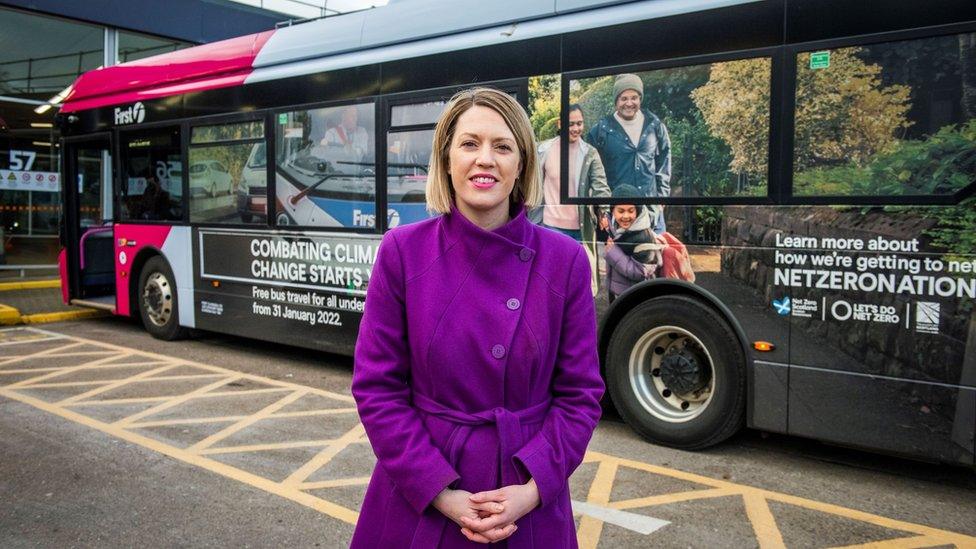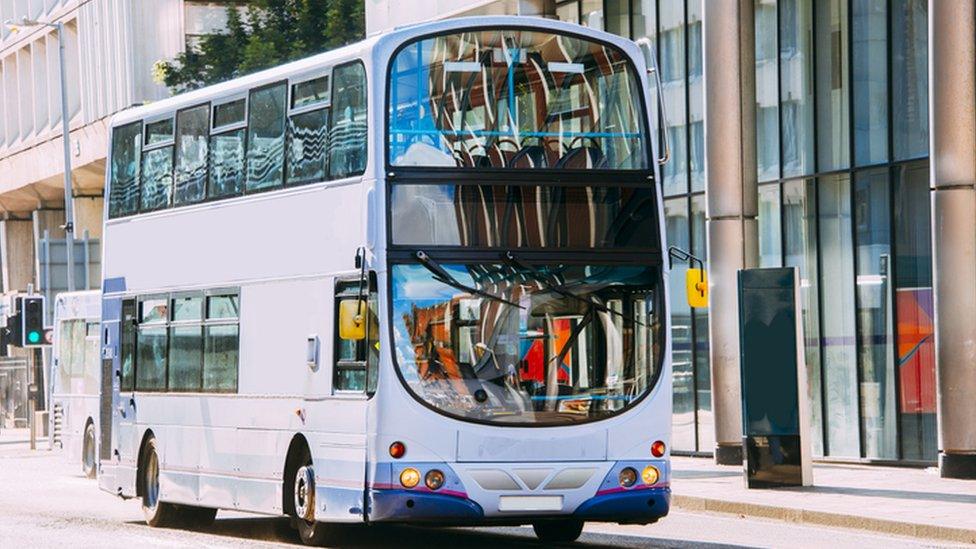Councils given powers to run own bus services
- Published

Transport Minister Jenny Gilruth hopes the move will revitalise local services
Councils have been given new powers to run their own bus services.
From Monday, local authorities have the flexibility to set up services to benefit local communities.
Since 1985, local transport authorities have been prevented from running services, but this has been reversed by changes to existing legislation.
Local government body Cosla welcomed the move but said it was not a "magic solution" and councils "would need funding to take advantage".
Transport Minister Jenny Gilruth hoped the powers would give councils flexibility and would revitalise local services.
Councils will not have to run services themselves under the new set-up, and can instead opt for a partnership or franchise approach.
Ms Gilruth said: "The act was designed to help make Scotland's transport network cleaner, smarter and more accessible than ever before.
"By giving local authorities the flexible tools they need to respond to their own transport challenges, we can deliver a more responsive and sustainable transport system for everyone in Scotland."
Ms Gilruth said the Scottish government was placing buses at the front of its commitment "to reduce car kilometres" by 20% by 2030.
She highlighted more than £500m in long-term funding for bus infrastructure, the rollout of free bus travel for under-22s and investment to encourage a shift to zero-emission buses.
Funding needed
Cosla's environment and economy spokeswoman Gail Macgregor said that bus services were the backbone of public transport in Scotland and "essential to cost effective, low carbon transport".
However, she added: "The new powers don't offer a magic solution and councils will still need funding to take advantage of them, but they are a step in the right direction, and I am pleased they are being launched today. How Councils can be resourced to use these new powers will be a discussion which we want to have with Scottish government in the weeks to come."
Scottish Labour Transport spokesman Neil Bibby also welcomed the new powers which he highlighted had been handed to councils "almost three years after they were agreed by this parliament".
He said "Years of decline have left bus networks across Scotland on the brink of collapse, and Scottish Labour have long fought for councils to get these powers so they can run and regulate services to meet the needs of their area."
But Mr Bibby added: "The SNP are granting councils new powers with one hand while slashing their budget with the other, leaving councils in an impossible position."

Will this idea take to the road?
Supporters of the bus network say it's the Cinderella service in public transport, and in desperate need of help. Every day, far more people travel by bus than train, but they don't get the same attention when things go wrong or the same level of funding per passenger mile.
In recent decades, Scotland's bus services have got worse by some measures, with passenger numbers falling, at the same time that bus firms reduced the number of buses they operate, and routes they serve.
The root of the problem, say some critics, is Scotland's deregulated bus network, brought in by Margaret Thatcher almost 40 years ago, which leaves it to the firms themselves to decide where services run - based on profit alone.
So how to fix the problem? The Scottish government's offering local authorities what it calls "flexible tools" to boost local bus services.
This includes the power for councils to create partnership deals with bus firms, to fill in gaps in the service. This means funding companies to run buses on neglected routes, which wouldn't otherwise be profitable.
There's also the power to allow councils to set up franchise arrangements - like the one which operates in London. This would require bus firms to operate services across several less profitable routes in return for the right to run their buses on the busy profitable lines. It's the model used by CalMac ferries.
Finally - there's the nuclear option, with councils getting the right to set up their own "municipal" bus service which they run themselves or through a wholly-owned operator. It's what many bus campaigners want.
To work properly, a scheme like this might need a region's councils to work together to operate a service, as they already do, to good effect, in the Lothians.
But such a scheme faces challenges - not least the upfront cost of establishing a big regional bus operator from scratch. There's also the potential political hurdle of persuading several councils to team up to create a joint venture of this kind. So would a minority SNP council want to join forces with a majority Labour one?
But, whatever powers councils may have, much depends on funding. By one recent estimate, train journeys get as much as 10 times the funding per passenger mile as bus journeys. So unless this Cinderella service gets more financial support, it's likely to disappoint.
Related topics
- Published11 March 2022

- Published20 May 2022
